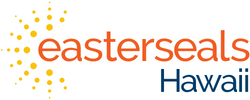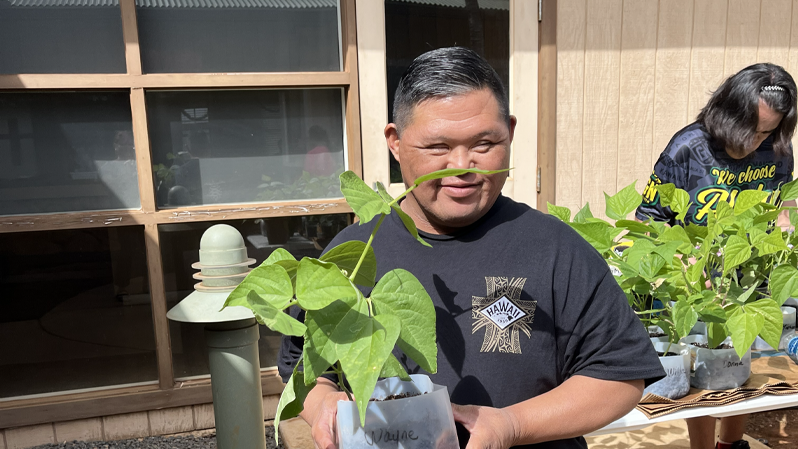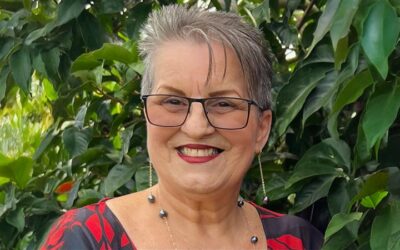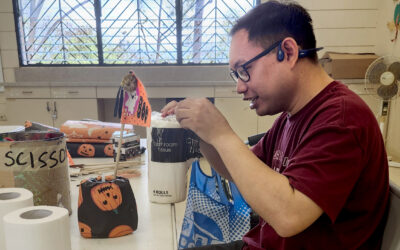Wayne, 52, lives on Kauai with his eldest sister, Ella, and participates in adult home and community-based services. Their family’s journey is one that mirrors what many other families have experienced, and one that isn’t talked about nearly enough. What happens when an adult child who needs caregiving is being cared for by someone who now needs caregiving themselves? Someone who, despite all their love and devotion, is robbed of ability due to illness. The solutions are rarely easy, and certainly not one-size-fits-all.
For individuals with intellectual and developmental disabilities (I/DD), new obstacles can arise for their whole family as they enter their golden years—adjusting to new schedules and routines, balancing multiple health needs across family members, and coming to terms with a primary caregiver’s own mortality are part and parcel as parents and caregivers find themselves needed to be cared for by their children. And that goes for Wayne, who had lived with his mother his entire life.
The youngest of four children, Wayne, who has Down syndrome, is friendly, fun-loving and easy going. “He’s a one-word kind of guy,” Ella shares fondly. “He answers questions with a ‘yep’ or a ‘nope’, but he really loves to be around people, smiling, waving hello and being part of the community.”
Shortly after graduating from high school, Wayne briefly attended another ADH program. After leaving the program, Wayne spent the next 30 years enjoying a full and active life with his mom. They spent a lot of time together and often socialized with her friends, visited thrift stores and walked around farmers markets enjoying the scenery and friendly faces. When Ella was home visiting, it was on one of these trips to the farmers market that their mom began showing signs of dementia, and Ella realized it was time for a change.
“I looked at my mom and brother walking ahead of me,” says Ella. “I saw that my mother, Wayne’s primary caregiver, now needed caregiving herself. I saw my brother helping to hold my mom up as she walked slowly into a store, and I said it’s time to come home.” Not long after, their mother was diagnosed with Alzheimer’s disease, and everything changed very quickly. So, Ella, who had been living on Oahu for decades, packed up her entire life and headed back to Kauai to care for her family.
On Kauai, adult day programs for people like Wayne are unfortunately pretty limited. “I really didn’t know what was out there,” says Ella. “I just knew that we needed a place for Wayne to go, a place where Wayne could thrive and start going out into the community more.” She remembered hearing about Easterseals Hawaii, so she went ahead and called.
It was Anne, a care coordinator, who answered and stayed on the phone with Ella for close to an hour. “We were in crisis mode at that point,” remembers Ella. “My mom had been hospitalized, and I didn’t have a place lined up for Wayne.” Anne was instrumental in getting the ball rolling, answering all their questions and explaining how the program could meet the goals they had been envisioning for him. They visited the program and felt welcomed instantly. Almost immediately, Wayne joined the program and was making friends right away.
About 5 months later, Wayne and Ella’s mother passed away. It was a devastating time for them bidding farewell to their mom, but they were grateful to be together as they started a new chapter.
Many of the activities at Wayne’s program have helped him cope with the loss of his mother and have given him more confidence to socialize even more in the community. He participates in lots of social events for adults with I/DD through his church and hangs out with his friends on weekends. Ella says he’s thriving. “He has a full schedule each week, but he looks forward to it all,” she says.
The sense of community Wayne and Ella have is something that has given them comfort, especially during those early days of crisis. Having an instant team on their side after that first phone call to Easterseals Hawaii made a big impact on their family—something Ella in particular wants others to know about. “I hope sharing this story can help some other people who are facing something similar to my family,” says Ella. “There are resources out there, and people ready to help—ready to provide what’s needed for our family members who are disabled, and what’s needed even for those of us who find ourselves as sudden caregivers.”
If you or someone you know is facing a situation like Ella and Wayne and are in need of quality programming for an adult with I/DD, contact us at [email protected].




